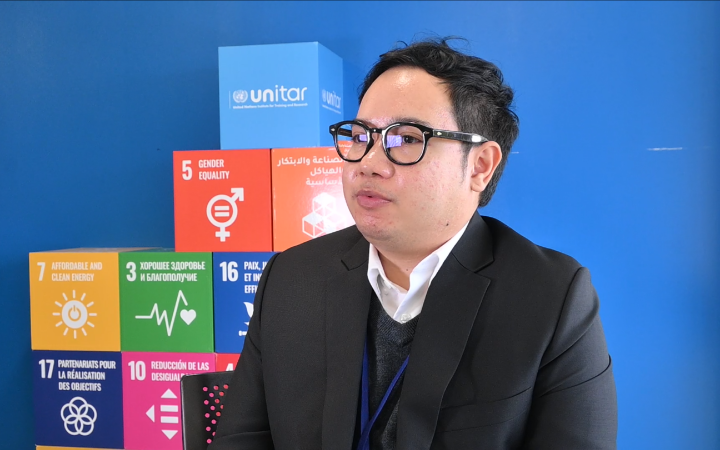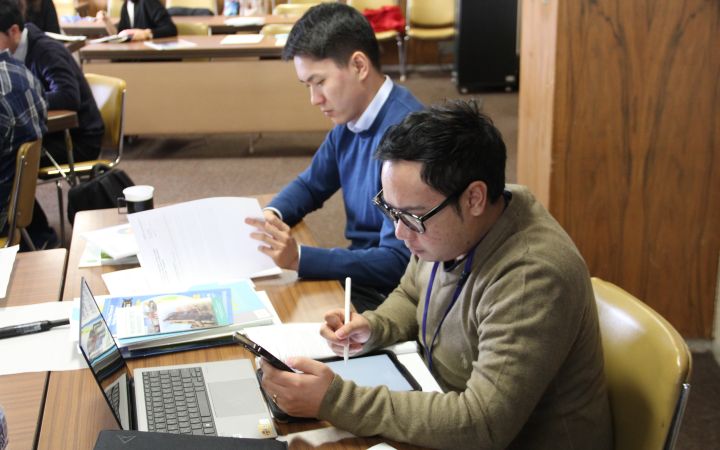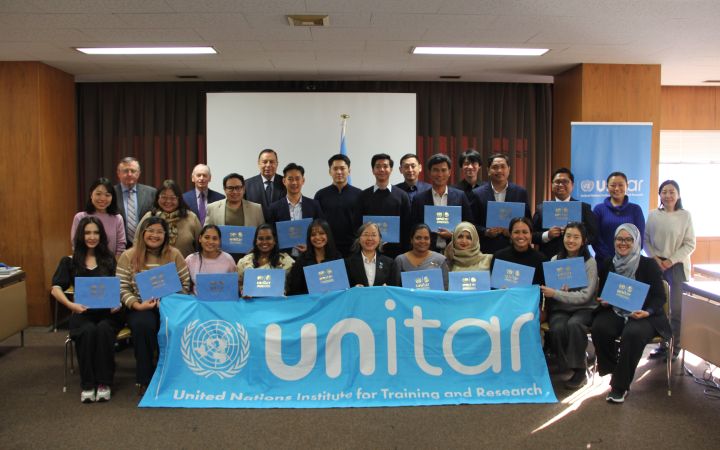- Diplomat Aiyarat Kosakul of Thailand participated in UNITAR Hiroshima Nuclear Disarmament and Non-Proliferation Training Programme in February 2024.
- The programme provided fundamental information about global nuclear disarmament with perspectives unique to Hiroshima.
- Aiyarat relishes the dynamism of diplomacy. He expects to collaborate with his fellow UNITAR alumni in the future.
8 November 2024, Hiroshima, Japan - Aiyarat Kosakul is First Secretary of the Ministry of Foreign Affairs of Thailand. He works in the Peace Security and Disarmament Division on issues related to weapons of mass destruction and chemical, biological and conventional weapons. He was nominated by his government to join the UNITAR 2024 programme on nuclear disarmament and non-proliferation in Hiroshima, Japan. The programme provided him a fundamental understanding of nuclear disarmament, allowing him to approach his work with a broader perspective.
THE INHUMANITY OF NUCLEAR WEAPONS
Aiyarat became a diplomat from his motivation to serve his country and take on dynamic issues. He was one of the 18 government officials from the Asia-Pacific who met for a week in February 2024 in Hiroshima for the 2024 Nuclear Disarmament and Non-Proliferation (NDNP) Training Programme. Supported by the Hiroshima Prefectural Government and Hiroshima City, the programme sought to update the diplomats’ understanding of nuclear disarmament and non-proliferation, build their negotiation skills and encourage networking among those in the region on the front lines of negotiation.
Aiyarat said the UNITAR NDNP Programme was comprehensive and effective, allowing him to engage with top-notch lecturers and field experts while providing Hiroshima-specific nuance and depth to his experience. Aiyarat was especially struck by the visit to the Hiroshima Peace Museum, where participants saw the relics left behind by the victims of the atomic bombing. The experience powerfully communicated to him the inhumane nature of nuclear weapons.
It is the best opportunity for all the participants to learn not only in academic ways, but to experience [themselves] the impact of the nuclear weapons on the people and on the city.” —Aiyarat Kosakul, First Secretary, Ministry of Foreign Affairs, Thailand
Although Aiyarat does not currently work directly in nuclear disarmament, he found the UNITAR programme useful, as nuclear disarmament and non-proliferation are closely related to his field of work. “For example, when I analyse or work for a biological weapons issue, we will consider the elements of the Treaty on the Non-Proliferation of Nuclear Weapons, to compare to those bodies”, he says. Given that diplomats rotate assignments, he also feels better prepared should he one day be assigned to nuclear disarmament.
BECOMING A BETTER DIPLOMAT
Aiyarat relishes the dynamism of his career. Diplomats rotate stations and assignments, so they must adjust to new cultures, food and environments, quickly learn new areas of specializations, and work with different bosses and colleagues. A self-identified extrovert, he enjoys meeting new people from around the world, and the UNITAR programme was no exception. He connected with peers who also work with UN security frameworks. Aiyarat is confident he and his fellow UNITAR alumni will have opportunities to collaborate in the future.
All the conflicts in the world ended not by war, but by negotiation. I believe that peace can be achieved without any war and without any weapons.” —Aiyarat Kosakul, First Secretary, Ministry of Foreign Affairs, Thailand
He recommends the UNITAR programme to other diplomats, saying “I want to inspire other diplomats to join this programme if they have the opportunity, because this will make them a much better diplomat.”
THAILAND AND NUCLEAR DISARMAMENT
Thailand co-sponsored the 2023 UN Treaty on the Prohibition of Nuclear Weapons. Aiyarat says, “Thailand is committed to the full and effective implementation of international agreements on the disarmament and non-proliferation of nuclear weapons.” Thailand prioritizes all three pillars of the 1968 Non-Proliferation Treaty: non-proliferation, disarmament and peaceful use of nuclear energy.
United Nations Online Volunteer Alana Picozzi contributed to this article.
About Unitar
The United Nations Institute for Training and Research (UNITAR) is a dedicated training arm of the United Nations. In 2023, UNITAR trained over 540,000 learners around the world to support their actions for a better future. UNITAR has a global presence, with offices in Geneva, Hiroshima, New York and Bonn and networks around the world. Find out more at https://unitar.org .




